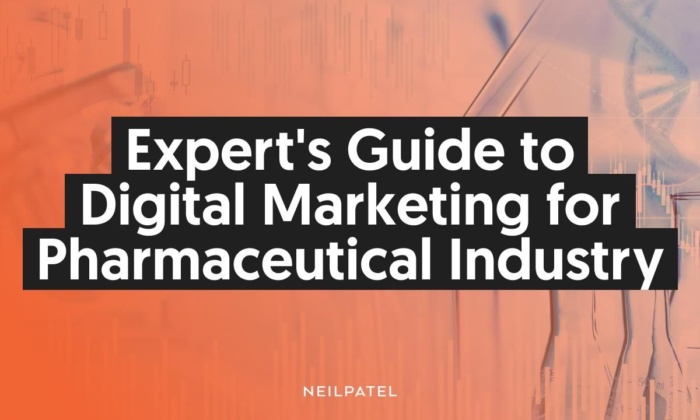
Ever wondered how to stand out in the complex and regulated pharmaceutical landscape, especially with the constant evolution of digital marketing? The pharmaceutical industry poses unique challenges, including regulatory constraints, scientific complexities, and an audience that demands expertise and reliability. Yet, a well-executed digital marketing strategy can significantly bolster a pharmaceutical brand, enhancing awareness, stimulating engagement, and driving conversions.
So, how can you cut through the noise to effectively connect with your audience in an industry characterized by strict regulations and intense competition? How can you achieve this while educating, fostering trust, and nurturing relationships?
This is what we’re going to explore today. I’ll share my insights, tips, and proven strategies to ace digital marketing in the pharmaceutical industry. By the end of this guide, you’ll have a clearer understanding of how to navigate the digital landscape and find success in pharma marketing.
Ready to dive in? Let’s go.
What’s Involved with Pharmaceutical Marketing?
Pharmaceutical marketing, or pharma marketing, goes beyond just promoting a product. It’s about navigating a complex environment, balancing medical accuracy with compelling storytelling, and reaching diverse stakeholders — from doctors to patients to pharmacists.
It involves understanding the science behind the products and translating complex medical jargon into easily digestible information that informs and engages. It’s about building relationships based on trust and providing value at every stage of the patient journey. And in an industry with a total market value estimated at $1.48 trillion in 2022, trust is key.
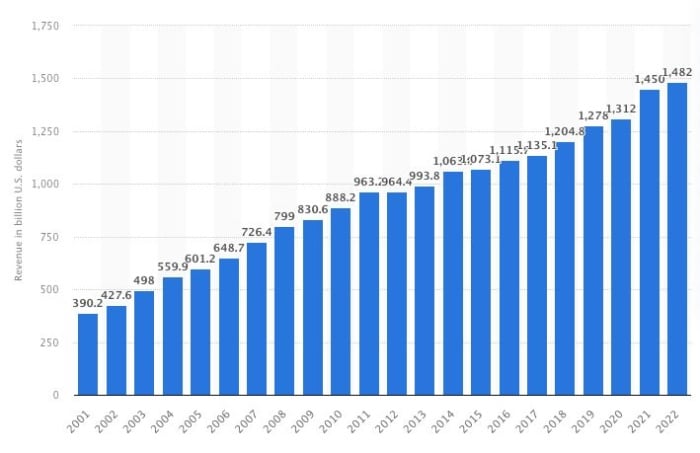
A successful pharmaceutical marketing strategy not only boosts brand visibility but also fosters patient education, supports healthcare providers, and ultimately contributes to better health outcomes. It’s a demanding job, but it can be equally rewarding with the right approach.
Understanding Pharma Digital Marketing Regulations
Regarding digital marketing for the pharmaceutical industry, one word you’ll often hear is compliance. The pharma sector is heavily regulated, with strict rules governing what you can say, how you say it, and who you can say it to.
For example, the U.S. Food and Drug Administration (FDA) sets guidelines to ensure all promotional content is accurate, balanced, and not misleading. Any claims you make must be backed up by scientific evidence, potential side effects must be clearly stated, and off-label uses are a no-go.
While these regulations might seem restrictive, they serve a crucial purpose: protecting consumers and ensuring they receive accurate information to make informed healthcare decisions.
Best Practices for Ensuring Compliance
Ensuring compliance in pharmaceutical marketing is non-negotiable. Here are some best practices to keep in mind when developing and implementing your digital marketing strategies:
- Familiarize Yourself with Regulations: The first step in ensuring compliance is fully understanding the regulations. This includes FDA guidelines for the U.S., EMA guidelines for Europe, and any other relevant local regulations. Each regulatory body has specific rules regarding pharmaceutical promotion, and understanding these will help guide your strategy.
- Create a Comprehensive Compliance Plan: Having a plan in place that outlines how to maintain compliance is crucial. This should include strategies for regular training, content approval processes, and procedures for handling potential non-compliance issues.
- Regular Training and Education: Everyone involved in creating and distributing marketing materials should be well-versed in the regulations. Regular training sessions ensure that your team stays updated with any guidelines changes.
- Clear and Accurate Communication: The information you share should be accurate, clear, and not misleading. It’s essential to avoid overstating the effectiveness of a product, downplaying risks, or promoting off-label use.
- Maintain Records: Keep a record of all promotional materials, including when and where they were distributed. In the event of an audit or inquiry, having comprehensive records will prove invaluable.
- Utilize Legal and Regulatory Counsel: Don’t hesitate to consult with legal or regulatory professionals. Their expertise can guide your marketing strategies, ensuring you avoid potential pitfalls and maintain compliance.
- Incorporate Fair Balance: This principle means that if you are advertising the benefits of a drug, you must also clearly communicate its risks. This can include side effects, contraindications, or other important safety information.
- Implement a Robust Review Process: Before any piece of content goes live, it should go through a thorough review process. This step ensures that all materials meet compliance standards and can help prevent potential issues. Here are the steps it typically involves:
- Preliminary Content Review: This is the first step after content creation where the content is checked for any glaring errors or inconsistencies. It’s essential to have a knowledgeable person or team conduct this initial review, as they can catch potential compliance issues early on.
- Compliance Review: Next, the content should be passed to a compliance or legal team adept at understanding the complexities of pharmaceutical regulations. They ensure that the material meets industry and legal standards and makes no claims or statements that could lead to regulatory issues.
- Final Review and Approval: Once the content has been vetted for compliance, it moves to the final stage. Senior management or a dedicated approval team checks for overall coherence and alignment with the brand message and ensures that the content meets all regulatory requirements. Only after receiving their approval can the content go live.
By prioritizing compliance in your pharmaceutical marketing strategies, you protect your organization and build trust with your consumers. Ultimately, a commitment to ethical, transparent communication benefits everyone involved.
Building Your Pharmaceutical Digital Marketing Plan
Building a digital marketing plan for the pharmaceutical industry is a meticulous process that requires a deep understanding of the landscape, a clear vision of your goals, and a unique approach that sets you apart. Let’s dive into how you can craft a plan that is both effective and compliant.
Learning the Landscape and Your Audience
The first step in creating a successful pharma marketing plan is understanding the landscape you’re operating in and who your audience is.
Research industry trends, keep an eye on the medical SEO terminology competitors are going after, and stay updated on regulatory changes. This will help you navigate the sector and identify opportunities for your brand.
Next, understand your audience. Are you marketing to physicians, pharmacists, or directly to patients? Each group has different needs, interests, and ways they consume information. By understanding these nuances, you can tailor your messaging to resonate with each segment, effectively addressing their concerns and providing value.
Defining Goals
Without clear goals, your marketing plan is like a ship without a compass. Whether it’s increasing brand awareness, educating consumers, driving website traffic, or boosting conversions, defining your goals will guide your efforts.
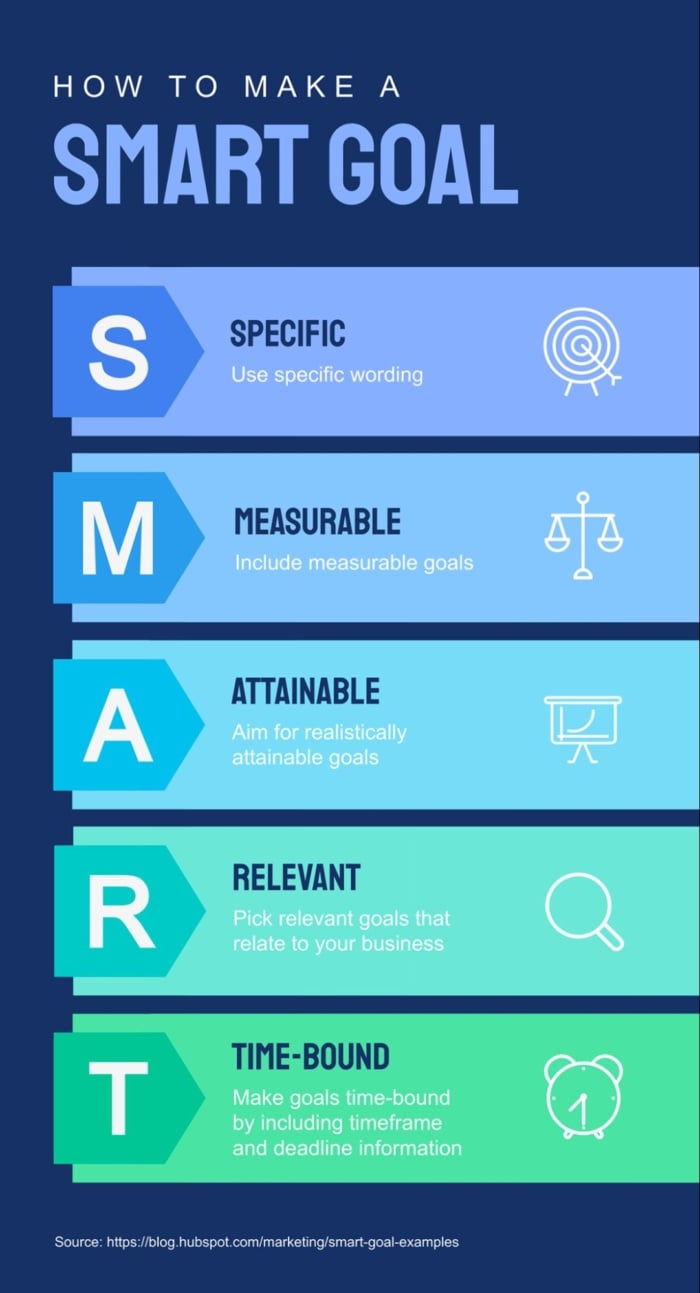
Source: Visme
Remember to make your goals SMART — Specific, Measurable, Achievable, Relevant, and Time-bound. This provides a clear vision and enables you to track progress and make necessary adjustments along the way. Your marketing funnel may be longer, but it will also be more effective.
Finding Your Edge
The pharmaceutical industry is a crowded space, so finding a way to distinguish your brand is crucial. This could be anything from a unique branding strategy, an innovative way of engaging with your audience, or a compelling storytelling approach.
Perhaps your edge lies in providing comprehensive, easy-to-understand patient education materials, or maybe your commitment to transparency sets you apart. Whatever it is, find your unique selling proposition (USP) and leverage it to distinguish your brand from the competition.
7 Strategies for Digital Marketing in the Pharmaceutical Industry
Let’s dive into some specific tactics that can supercharge your pharmaceutical digital marketing efforts. From valuable content marketing to drive leads to leveraging the power of AI, here are seven strategies you can incorporate:
1. Produce Value-Focused, Branded Content
In the world of pharma marketing, content needs to be valuable, accurate, and branded. Whether it’s blog posts, patient education materials, videos, or infographics, your content should offer meaningful insights while adhering to brand guidelines. Additionally, it must comply with regulations, ensuring any claims are backed up by solid evidence.
For example, if your audience is comprised largely of medical professionals, white papers and in-depth articles on recent clinical studies can be valuable. Clear and empathetic explainer videos about how your product works could be impactful if you’re reaching out to patients. And remember, while you’re crafting this valuable content, every claim must align with your brand guidelines and be supported by scientific evidence.
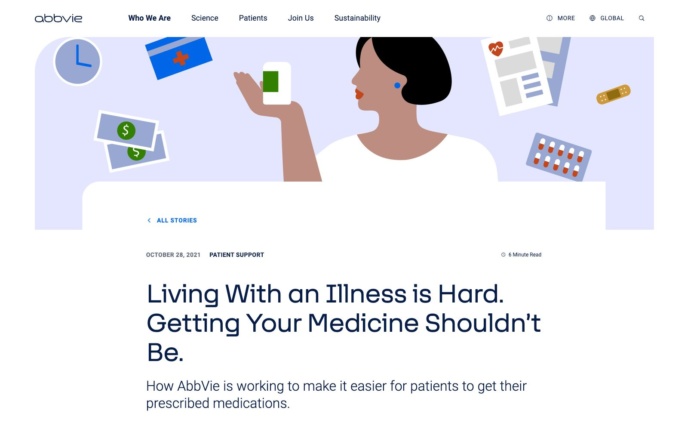
Source: Abbvie
2. Optimize for Pharmaceutical Search
Pharma consumers — healthcare professionals and patients — rely heavily on online searches to find information. Implement a robust SEO strategy to ensure your brand appears when users search for relevant keywords. This includes optimizing your website structure, using relevant meta tags, creating SEO-friendly content, and more.
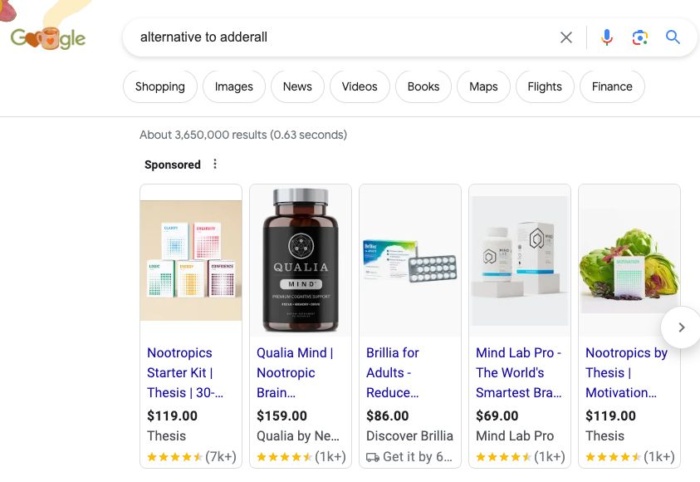
For example, if your company specializes in a specific drug for ADHD, using keywords like “new ADD treatment” or “alternative to adderall” in your content and metadata can improve visibility. Also, remember to optimize your website structure for search engines and user navigation.
3. Leverage Social Media Influencers
While compliance considerations may make social media marketing challenging in the pharma industry, there’s one area where you can really shine: influencer marketing. Connect with influencers who align with your brand values and can communicate your message authentically. This could be doctors, health advocates, or patients who share their journeys.
For example, partnering with a cardiologist to share the benefits of your heart disease medication on their Instagram could reach a large audience that values their opinion. When working with influencers, it’s very important to take the time to make sure that any partnerships or content you create are fully compliant. Additionally, you should always ensure the influencers you work with disclose the partnership to maintain transparency and adhere to FTC guidelines.
4. Host Virtual Events and Webinars
Virtual events and webinars provide a platform to connect directly with your audience. You can use them to educate about a disease area, discuss the latest research, or present a product demonstration. It’s a great way to engage your audience, establish thought leadership, and collect first-party data.
For example, you might host a webinar to explain the science behind your latest drug release, with a Q&A session that allows attendees to get their questions answered directly. This promotes your product and helps establish your brand as a thought leader.
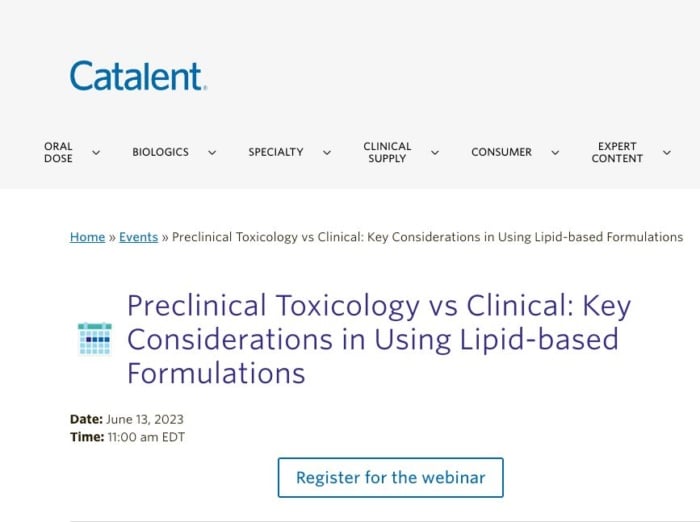
Source: Catalent
5. Take Advantage of Email Marketing
Despite the rise of other digital channels, email marketing remains a powerful tool. It allows for direct communication with your audience and can be highly personalized. Remember to comply with opt-in rules and respect the inbox of your subscribers.
For example, you could set up a monthly newsletter featuring the latest updates on your drug development, insightful blog articles, and patient success stories. Tailoring content to individual recipients’ interests based on their behavior or past interactions can also enhance engagement.
6. Incorporate Artificial Intelligence (AI)
AI can revolutionize your pharmaceutical marketing strategy. From AI chatbots providing customer support to predictive analytics improving campaign performance, AI offers a range of possibilities. Make sure any AI use is transparent and respects user privacy.
For example, AI chatbots on your website can offer round-the-clock customer support, answering frequently asked questions about your drugs or guiding users to relevant resources. Predictive analytics can analyze past campaign data to predict future trends, helping you optimize your marketing efforts for better results.
7. Personalize and Segment All of Your Marketing Channels
Personalization is the key to standing out in today’s noisy digital world. Segment your audience based on their behavior, needs, or demographics, and tailor your messaging accordingly. A personalized user experience can drive engagement, improve conversion rates, and build customer loyalty.
For example, if you’re a pharmaceutical company specializing in oncology, you might segment your audience into oncologists and healthcare professionals, researchers, and patients and caregivers, providing personalized content for each group. An oncologist might appreciate advanced data from clinical trials, while a patient may find more value in personal stories of recovery and manageable treatment plans.
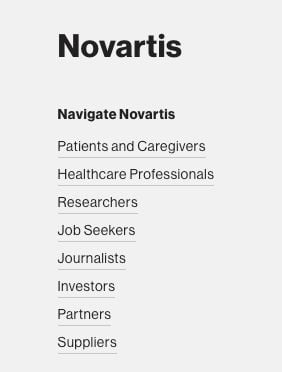
Source: Novartis
FAQs
Pharmaceutical marketing, or pharma marketing, promotes pharmaceutical (or pharma) products to its potential customers. These products can be drugs, medications, services, or even awareness campaigns about specific health issues. The target audience for these promotions can vary, including healthcare professionals such as doctors and nurses, pharmacists, hospital administrators, and even the patients themselves.
Implementing a successful pharmaceutical marketing strategy involves:
1. A deep understanding of the healthcare landscape
2. Adherence to strict regulatory guidelines
3. The ability to connect with a diverse range of stakeholders
Key strategies often include:
1. Producing high-value branded content
2. Optimizing for pharmaceutical search terms
3. Leveraging the power of social media and influencers
4. Hosting educational virtual events and webinars
5. Utilizing email marketing
6. Incorporating artificial intelligence
7. Personalizing your marketing channels
It’s a complex process, but it can significantly elevate a pharmaceutical brand and drive better health outcomes when done right.
Digital marketing in the pharmaceutical industry is unique because of its strict regulations. Every marketing campaign claim must be substantiated by scientific evidence, potential side effects must be clearly stated, and promotions for off-label uses are strictly prohibited. Additionally, the target audience for pharma marketing is often more specialized, including healthcare professionals and patients, who require a different kind of messaging compared to traditional B2C or B2B audiences.
Compliance is crucial to ensure consumers’ safety and maintain the industry’s integrity. Misinformation or misleading promotions can have serious health consequences. Therefore, all marketing materials must adhere to strict guidelines set by regulatory bodies, ensuring that all claims are accurate, balanced, and not misleading.
A pharmaceutical digital marketing plan typically includes:
1. Understanding the landscape and your audience
2. Defining your goals
3. Finding your unique selling proposition
Additionally, implementing strategies such as value-focused content, SEO optimization, social media and influencer marketing, virtual events and webinars, email marketing, AI incorporation, and personalization across all marketing channels is crucial to a successful pharmaceutical digital marketing plan.
Conclusion
Navigating the world of pharmaceutical marketing can be challenging, filled with strict regulatory frameworks and a highly specialized audience. However, with the right approach, it can also be a rewarding one. You can make a genuine impact by building a strong, compliant digital marketing plan, understanding your audience, setting clear goals, and leveraging your unique edge.
Pharma marketing is not just about promoting a product — it’s about facilitating better health outcomes, educating the public, and supporting healthcare professionals. And when we use digital marketing strategically in this sphere, we’re doing much more than just increasing brand awareness— we’re contributing to a healthier, more informed world.
How will you adapt your digital marketing strategies to drive success in the pharmaceutical industry landscape?

See How My Agency Can Drive More Traffic to Your Website
- SEO - unlock more SEO traffic. See real results.
- Content Marketing - our team creates epic content that will get shared, get links, and attract traffic.
- Paid Media - effective paid strategies with clear ROI.
Are You Using Google Ads? Try Our FREE Ads Grader!
Stop wasting money and unlock the hidden potential of your advertising.
- Discover the power of intentional advertising.
- Reach your ideal target audience.
- Maximize ad spend efficiency.
"strategy" - Google News
June 19, 2023 at 02:00AM
https://ift.tt/QyLUg7p
Expert’s Guide to Digital Marketing for Pharmaceutical Industry - NeilPatel.com
"strategy" - Google News
https://ift.tt/VFCZisg
https://ift.tt/DTFS1Ig
Bagikan Berita Ini
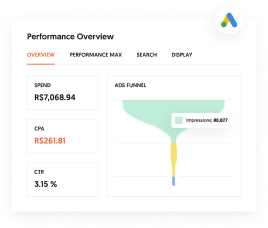














0 Response to "Experts Guide to Digital Marketing for Pharmaceutical Industry - NeilPatel.com"
Post a Comment